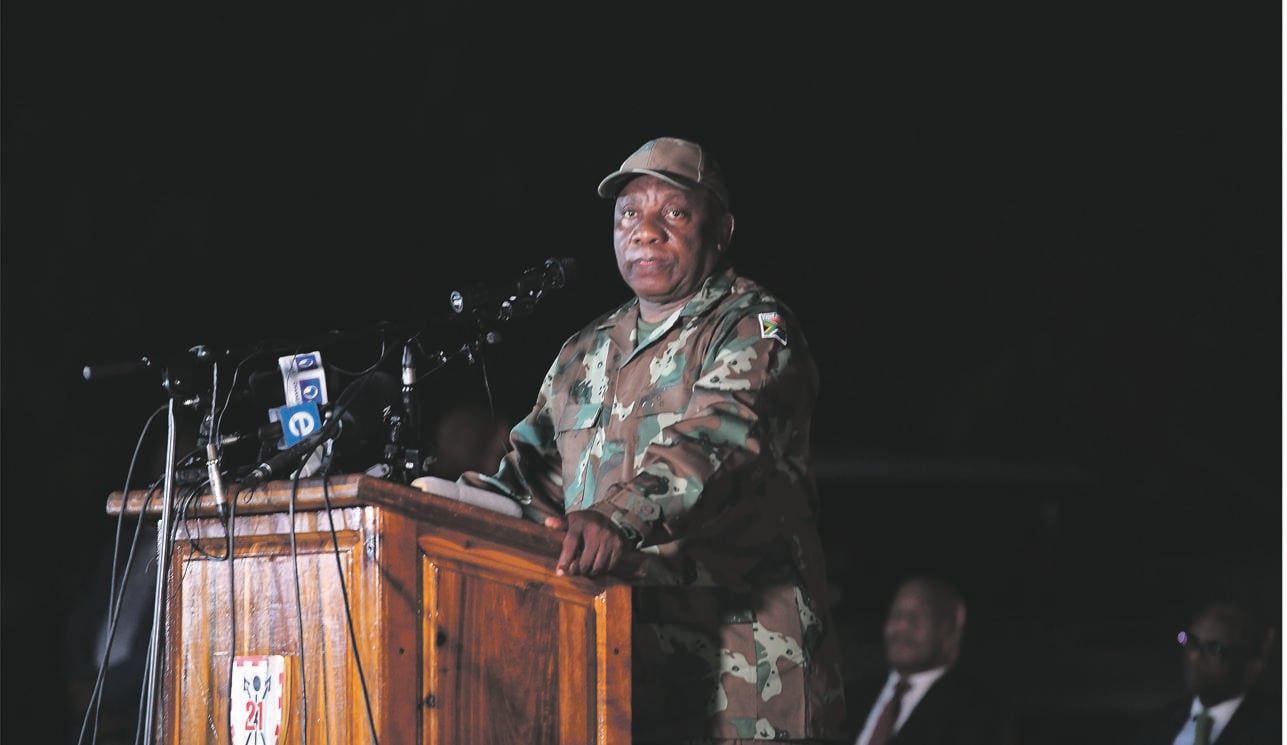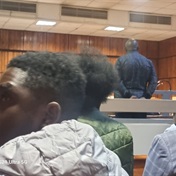
The president can no longer please and appease. Going forth, SA requires firm leadership in the front, writes Mondli Makhanya.
It is a function of history that wars often define the legacies of leaders.
You can rattle off like an automatic weapon the names of leaders who catapulted to legendary status by the way they led in times of war.
Some were solid leaders in their own right, who just stepped up the gear when war came along.
Others were either weak or terrible leaders who used the time of war to cover their shortcomings and bolster their standing.
War, after all, is a fearful and uncertain time, when populations look for strong leadership.
So it is no surprise that world leaders have resorted to the war analogy when talking about overcoming the Covid-19 coronavirus and rallying their citizens to do everything they can to stop its spread.
“We are at war,” French President Emmanuel Macron said as the country’s infections climbed to unmanageable levels, forcing the government to take extraordinary measures.
“We must act like any wartime government and do whatever it takes to support our economy,” British Prime Minister Boris Johnson said when announcing measures to fight Covid-19.
Italian Prime Minister Giuseppe Conte harked back to World War 2 when he said the country was facing “the most difficult crisis in our post-war period”, as he imposed draconian restrictions on Italians.
Germany’s Angela Merkel invoked similar imagery, saying that “there has been no such challenge to our country since German reunification – no, since World War 2 – that relies so much on our joint action in solidarity”.
And so the pattern went, from country to country, from continent to continent, with leaders invoking images of wartime to sensitise citizens to the seriousness of this crisis and convince them that this is a state of siege.
President Cyril Ramaphosa, long derided as being weak and indecisive, was not to be left out.
Over the past two weeks of leading the national effort against Covid-19, he called the efforts “a war against an invisible enemy”.
On Thursday night, as he addressed SA National Defence Force members who were about to be deployed into cities and dorpies to help the police enforce the 21-day lockdown, Ramaphosa even donned an army uniform.
The president told the troops that as the commander-in-chief of the armed forces he wanted to show them that he was one of them.
He would join them on the streets during their deployment as they helped fight this invisible enemy that is the virus.
He reminded them that their oath was not just to defend the people against wars and insurrections, saying this was “the most important mission of your calling as soldiers, to give life to the people of South Africa”.
Earlier in the day, when he gave a similar pep talk to SA Police Service members, Ramaphosa had again taken on the persona of commander-in-chief, urging the men and women in blue to battle.
The weighty addresses were in similar vein to his public appearances over the past two weeks.
Even the most cynical would find it difficult to fault him in his leadership of the country since the virus hit our shores.
In his various addresses to the nation, he has been firm but compassionate.
He has burnt the midnight oil building a national consensus around the nation’s response to the pandemic.
He has met with religious leaders, trade unions, business, traditional leaders, the medical fraternity, leaders of all political parties and a host of other sectors of society in his bid to craft a unified front against this enemy.
So the inevitable question arises: Is this the turning point in the presidency of Matamela Cyril Ramaphosa?
Could this be the moment that he finally steps up and becomes the leader that South Africa was hoping he would become when he succeeded that double-headed species in February 2018?
Or is this bold leadership a flash in the pan, forced on him by current circumstances and unlikely to last beyond the crisis?
When he met with the SA National Editors’ Forum at the beginning, Ramaphosa defended his consensus leadership style, saying that if people saw this as a sign of weakness then he was quite okay with being called a weak leader.
This style of leadership had served him in building several lasting organisations, which he did “without shouting and screaming at people”.
“I build consensus. Some people would like me to be a dictator, [but] it is not in my make-up to be a dictator. I have never been [a dictator].”
This was a false equivalence. Nobody was asking him to be a despot or a “my way or the highway” leader.
He was being asked to lead, to be decisive and to not allow himself to be pushed around by people who had their own interests, and not those of the republic, at heart.
The nation just wasn’t feeling his leadership as he was obviously not prepared to rock any boat.
He was forever looking over his shoulder, worried about when the knives would be plunged into his back and from what angle.
Inadvertently (and this is a terrible thing to say) this crisis has strengthened his hand against his internal foes in the ANC, as well as his own allies who were hankering to make necessary economic policy decisions.
The crisis has derailed those who were plotting to deal with him at the ANC’s national general council, which was due to take place in July.
Since the beginning of the year, the faction that longs for the pre-Nasrec days has been ramping up its rhetoric about the Ramaphosa administration’s alleged failure to implement supposed radical economic transformation resolutions passed at the December 2017 conference.
This stick was to be used to beat him up and weaken him at the council, thereby setting the stage for his removal as ANC president in 2022 and possibly as president not long thereafter.
Either way, Ramaphosa was certain to be a one-term president.
The postponement of the council and all other party conferences, in line with social distancing, has now moved this conversation off the agenda.
With no meetings of any ANC structures taking place and social media dominated by one issue, oxygen has been sucked out of this project.
Even Carl Niehaus is twiddling his thumbs, wondering which phantom family member he should kill next.
Ramaphosa’s leadership during this crisis has propelled him back to the position he was in back in early 2018, when the country was rallying around him as it emerged from the wasted decade.
If he continues with his decisive leadership (even if it is through consensus-building) throughout this crisis, it will be hard to make a case against him.
Another dose of bad news that will ironically work in Ramaphosa’s favour was Friday night’s downgrade to “junk” status by Moody’s ratings agency.
Although based on South Africa’s dismal economic performance, electricity shortages, a rising debt burden, economic reform lethargy and damage caused by state capture in the Jacob Zuma years, Moody’s flagged the effects of Covid-19 as a risk to South Africa’s recovery in the coming months.
Further downgrades by the other major ratings agencies that already have South Africa in junk status within months and by Moody’s in a year’s time are now distinct possibilities.
This development will make tough policy choices inevitable.
Decisions that Ramaphosa and his Cabinet could have made at reasonable and at a less damaging pace and scale will now be out of their hands.
That means whatever squabbles the ANC and its allies want to have about the direction of the country will now be academic.
What has to be done must be done.
This will be the test of the leadership that Ramaphosa has shown us he can exercise.
The waters we are entering are as treacherous as we can get. On this one there will be no space for consensus-building.
He will have to lead.
TALK TO US
Do you agree with the writer regarding President Cyril Ramaphosa’s leadership style?
SMS us on 35697 using the keyword CYRIL and tell us what you think. Please include your name and province. SMSes cost R1.50. By participating, you agree to receive occasional marketing material
| |||||||||||||
| |||||||||||||




 Publications
Publications
 Partners
Partners








